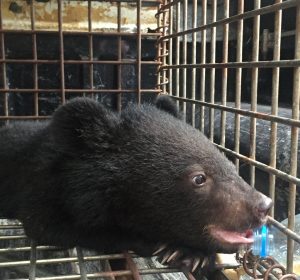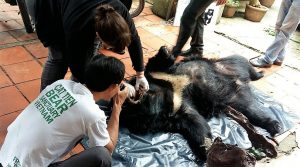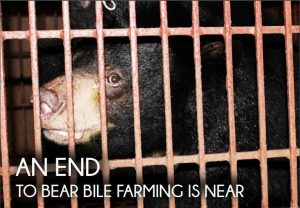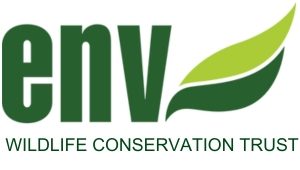While much energy is expended in persuading bear owners to part with their bears and in raising public awareness of the bear bile industry, there is a third component to ending bear farming in Vietnam.
This third, but crucial element, is the monitoring of bear farms. Effective and regular monitoring puts additional pressure on bear owners, making it more difficult for them to conduct the cruel and illegal business of bear bile extraction. This pressure, combined with other measures, will help owners come to the intended conclusion that the bile industry is not worth the trouble. With authorities watching them closely, bear bile prices falling, and costs increasing all these factors converge to make the business model unsustainable.
Bear farming in Vietnam is on the way out. Help us hasten the end by making a donation to our Prison Break Bears appeal
A robust inspection regime therefore is vital in making bear keeping an onerous task, deterring illegal activity and driving the move towards ending bear farming in Vietnam.
Why did bears end up on bear farms in the first place?
Between the 1990s and 2005 the number of bears kept on bile farms in Vietnam increased tenfold, from approximately 400 to over 4,000 due to demand for bear bile. Bears in bile farms, predominantly wild-caught Asiatic black bears, also known as moon bears, are regularly subjected to painful and often unsanitary procedures to extract bile from the gallbladder for use in traditional medicine.
Is it illegal to keep bear cubs born at a farm?
Current regulations are not clear about bear cubs born on farms. The previous version required owners to turn over the cubs to the government within a year, but this requirement was removed in the most recent version of the law, Decision 95/2008/QD-BNN, creating a loophole in the law that indeed threatens to perpetuate bear farming if older bears are then replaced by new bears born on farms. However, current law still prohibits bear farm owners from transferring or selling cubs born at their farms.

Can’t we just buy the bears and put them in a rescue center?
No, ENV believes strongly that bear owners who initially obtained bears illegally, have no right to ownership or compensation for the bears they have been keeping. They should consider themselves lucky that the government had dealt so leniently with them given the fact that they committed a criminal offense in purchasing protected wildlife, then used these bears for many years committing further offenses by extracting and selling bear bile in violation of the law.
Let’s remember that these people are not innocent. They exploited wildlife protected under the law for profit. Now that their illegal business is not profitable, they want the government to pay them to get out of the business. If you look at the facts, their argument is ridiculous.
If drug dealers were to be found with a kilo of heroin, could they expect the government to compensate them for their loss when it is confiscated? The fact is
 that dozens of bears are being turned over to authorities throughout Vietnam without compensation as many of bear owners have realized that bear bile farming is coming to an end very soon.
that dozens of bears are being turned over to authorities throughout Vietnam without compensation as many of bear owners have realized that bear bile farming is coming to an end very soon.
Do we have enough capacity to rehome all the farm bears at rescue centers in Vietnam?
At current rates of transfer, yes. If there was a sudden rush to hand over the remaining 705 bears, then the Vietnamese government and NGOs would work together to find a solution. The ‘not enough space’ argument is a red herring excuse to do nothing.

But bear farms will continue if there is demand, right?
Yes, but ENV is working hard to raise public awareness and change Vietnamese public opinion. Tens of thousands of people have signed bear bile pledge cards promising not to consume bear bile or purchase bear products. And thousands of people each year attend our bear bile exhibitions we stage at public spaces throughout Vietnam. Our Public Service Announcement videos, too, are seen by millions of people each year. Furthermore, ENV research has shown an over 60% drop in bear bile consumption since 2009 as people consign bear bile to the past in favor of cheaper, more effective and more readily available modern medicine.
Is bear bile farming still having an impact in wild bear populations in Vietnam?
Yes. Results from a recent survey carried out by Vinh University in 22 protected areas throughout Vietnam indicate that wild bear populations have declined precipitously throughout the country over the past 20 years.
Interviews with over 1,000 villagers living in and around the protected areas indicate that bear populations began declining since the 1990s, driven by hunting and trapping. This coincides with the time at which the practice of bear bile farming in Vietnam began to expand rapidly.
The report notes that none of the protected areas surveyed has a healthy population of wild bears. Despite severe declines, occasional reported sightings continue into recent years. The persistence of bears in some sites has been confirmed by recent camera trap images and is further evidenced by ongoing hunting and capture of wild bears. However, the individual bears detected by camera trap or caught by poachers over the past few years may represent the last remnants of populations with little to no prospect of recovery without immediate investment in conservation interventions such as protection and translocation.
How can I help bring about an end to bear farming in Vietnam?
- Do not consume bear bile or bear products.
- Report crimes involving the selling or trade of bear bile and bear products in Vietnam to local authorities or ENV’s Wildlife Crime Hotline, 1800-1522.
- Help educate others not to consume bear bile and bear products.
- Donate to our GoFundMe appeal
Where can I see ENV’s bear PSA videos?
All our bear-themed PSA videos are in our YouTube playlist here: https://goo.gl/tTsqAZ
Where can I find out more about ENV’s bear campaign work in Vietnam?
Go here for more details of our campaign to end bear farming in Vietnam.
Bear farming in Vietnam is on the way out. Help us hasten the end by making a donation to our Prison Break Bears appeal
